
ActiveCampaign
Founded Year
2003Stage
Series C | AliveTotal Raised
$360MValuation
$0000Last Raised
$240M | 4 yrs agoRevenue
$0000Mosaic Score The Mosaic Score is an algorithm that measures the overall financial health and market potential of private companies.
-41 points in the past 30 days
About ActiveCampaign
ActiveCampaign focuses on customer experience automation, operating within the marketing automation, email marketing, and Customer Relationship Management (CRM) sectors. The company offers services, including email marketing, marketing automation, e-commerce marketing, and CRM tools designed to help businesses engage meaningfully with their customers. ActiveCampaign primarily serves businesses of all sizes across various sectors, with a particular emphasis on the e-commerce industry. It was founded in 2003 and is based in Chicago, Illinois.
Loading...
ActiveCampaign's Product Videos
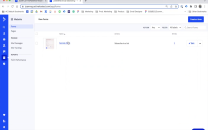
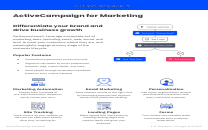
ESPs containing ActiveCampaign
The ESP matrix leverages data and analyst insight to identify and rank leading companies in a given technology landscape.
The marketing automation personalization market is focused on providing personalized and relevant experiences to customers across various digital channels. Vendors in this market offer solutions that use AI and data analytics to create personalized content and messaging for each customer, resulting in increased engagement, conversion rates, and customer loyalty. The market includes a range of prod…
ActiveCampaign named as Challenger among 15 other companies, including Bloomreach, Oracle, and Attentive.
ActiveCampaign's Products & Differentiators
Sales Automation & CRM
ActiveCampaign for Sales lets you sell more in less time by automating your sales process so you can focus on closing deals. Get full context into every contact and account, automatically trigger next best steps based on behavior and engagement, and seamlessly manage your pipeline. Offering unparalleled value as your business needs grow, ActiveCampaign provides unlimited automation every step of the way. Designed to meet the needs (and budgets) of growing businesses, ActiveCampaign’s CRM gives you everything you need to achieve today’s and tomorrow’s goals - with no surprises.
Loading...
Research containing ActiveCampaign
Get data-driven expert analysis from the CB Insights Intelligence Unit.
CB Insights Intelligence Analysts have mentioned ActiveCampaign in 3 CB Insights research briefs, most recently on Aug 14, 2023.
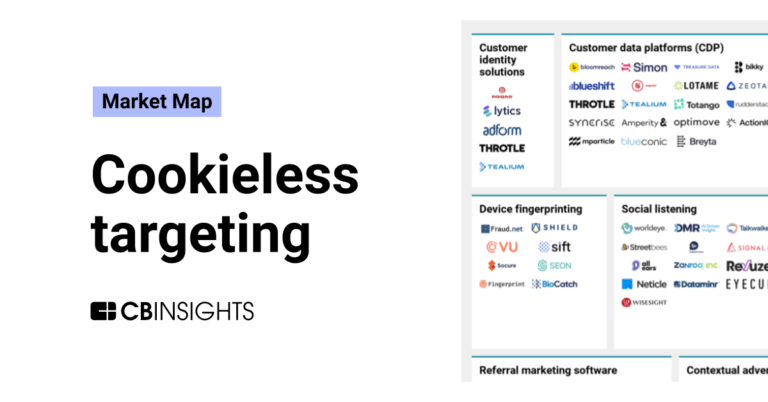
Aug 14, 2023
The cookieless targeting market map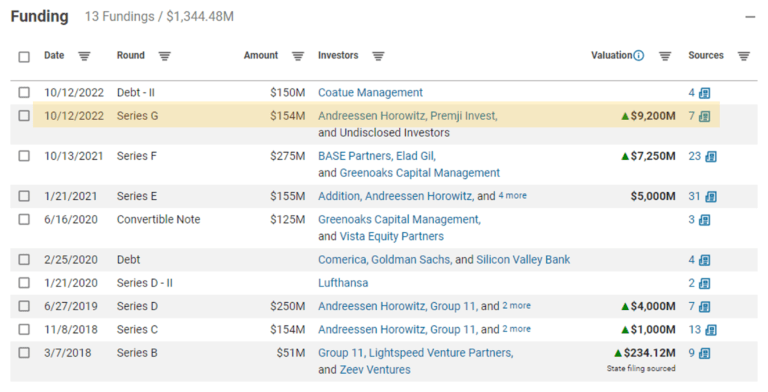
Oct 18, 2022
The Transcript from Yardstiq: Is Okta an M&A target?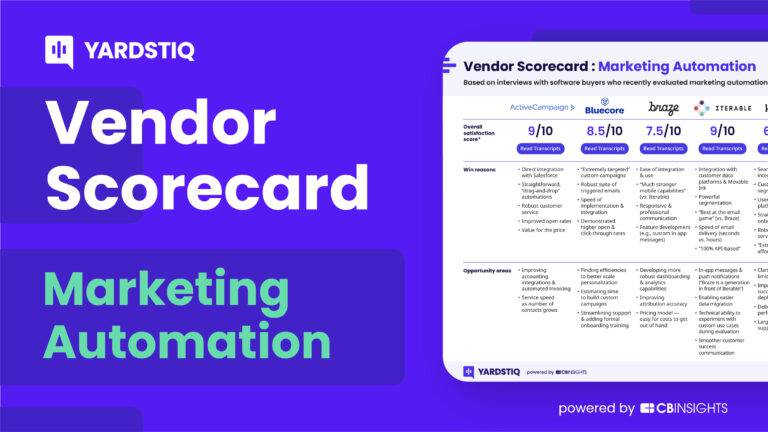
Oct 12, 2022 report
Top marketing automation companies — and why customers chose themExpert Collections containing ActiveCampaign
Expert Collections are analyst-curated lists that highlight the companies you need to know in the most important technology spaces.
ActiveCampaign is included in 3 Expert Collections, including Unicorns- Billion Dollar Startups.
Unicorns- Billion Dollar Startups
1,270 items
Targeted Marketing Tech
453 items
This Collection includes companies building technology that enables marketing teams to identify, reach, and engage with consumers seamlessly across channels.
Loyalty & Rewards Tech
178 items
Latest ActiveCampaign News
Apr 1, 2025
Success in email marketing isn’t just about sending messages—it’s about building meaningful, personalized connections that resonate with your audience. AI is revolutionizing the way businesses engage with customers by combining data-driven insights with intelligent automation. It empowers marketers to create smarter, more efficient, and more impactful campaigns. From crafting highly personalized emails to predicting the ideal time to send them, AI transforms how you connect with your audience. This article will dive into the key ways AI can elevate your email marketing , including its biggest advantages, real-world applications, actionable tips, and potential challenges to consider. You’ll also get a look at how AI is shaping the future of email marketing, redefining how businesses engage with their customers. What is AI in email marketing? AI in email marketing refers to the use of artificial intelligence to create smarter, more effective email campaigns. AI goes beyond traditional automation by analyzing data, identifying patterns, and making informed decisions to improve every aspect of your email strategy. Three key technologies drive this process: machine learning, predictive analytics, and automation: Machine learning enables AI to process and learn from large data sets, continually improving its ability to predict outcomes and optimize performance. Predictive analytics uses those insights to anticipate customer behavior, such as when someone is most likely to open an email or what type of content will grab their attention. Automation then integrates these insights into your workflows, making every campaign feel timely and personalized without adding to your workload. What makes AI stand out is how it uses data to go beyond standard automations. Instead of segmenting your audience based on basic rules, AI can fine-tune targeting, identify ideal send times, and craft highly personalized content—all tailored to each individual recipient. The result? Emails that feel relevant, engaging, and actionable. Think of it as having a personal assistant who works tirelessly behind the scenes to help you send the right message to the right person at the right time. Why email marketers should embrace AI, not be scared of it Artificial intelligence might sound like something reserved for tech-savvy marketers or large corporations with endless budgets, but the reality is quite different. AI in email marketing is designed to make your life easier, not more complicated. By embracing AI, you can create more engaging campaigns and save time while improving your return on investment—all without needing a technical background. Image sourced from bloggerspassion.com One of AI’s biggest strengths is its ability to deliver personalized experiences. While traditional email marketing might stop at using a recipient’s first name, AI takes personalization to the next level. It can analyze data points (like purchase history, browsing behavior, and preferences) to craft emails that feel like they were made just for that individual. This results in higher open and click-through rates, as well as stronger customer relationships. And it’s not just about personalization. AI can help you identify the best times to send emails, ensuring your message reaches your audience in the right place at the right time. Example: Predictive send-time optimization has been shown to boost open rates by as much as 30% . Add to that AI-powered tools that automatically refine subject lines, adjust email content, or optimize calls to action, and it’s clear why marketers are seeing such strong results. If you’re worried that adopting AI might be overly complex, don’t be. Many platforms, including ActiveCampaign, make it simple to integrate AI features into your existing email marketing workflows. With tools that generate copy, tailor email designs, and build entire customer journeys from a single prompt, even small businesses can tap into the power of AI. How AI is supercharging email marketing AI is transforming email marketing into a powerhouse of efficiency and personalization. With AI, you can analyze vast amounts of data, uncover actionable insights, and execute campaigns that connect with your audience on a deeper level. What used to require extensive manual time and effort can now be done much faster. Below, we’ll explore some of the most impactful ways AI is revolutionizing email marketing and how you can harness these tools to achieve better results for your campaigns. AI-driven segmentation Every successful email campaign starts with understanding your audience, and that’s where AI-driven segmentation shines. Instead of relying on broad categories like location or age, AI can group your contacts based on behaviors, preferences, and demographics. By analyzing purchase history, browsing activity, engagement levels, or other metrics, AI can uncover hidden insights to help you create hyper-targeted campaigns. For example: Behavioral segmentation: AI can identify contacts who frequently open emails about sales versus those who engage with educational content, allowing you to tailor your messaging accordingly. Predictive segmentation: By analyzing past behaviors, AI can predict future actions, such as which customers are likely to purchase soon or which might require re-engagement. Lookalike audiences: AI can identify common traits among your best-performing contacts and find similar profiles within your database, helping you expand your reach like never before. AI-based segmentation improves campaign relevance and can reduce unsubscribes by ensuring your audience receives the content they want. According to research, segmented email campaigns see a 760% increase in revenue compared to non-segmented ones. Send-time optimization Timing is everything in email marketing, and send-time optimization means your emails land in inboxes when they’re most likely to be opened. Instead of guessing when your audience is online, AI analyzes historical engagement data to pinpoint the perfect moment to send. For example, a customer typically checks their email at 8 a.m. on weekdays and 9 p.m. on weekends. With send-time optimization, AI automatically schedules emails to arrive right when that customer is most likely to see them. Dynamic content and personalization AI is also redefining personalization by creating emails that feel tailor-made for each subscriber. AI content creation goes far beyond inserting someone’s first name into the subject line. AI can customize entire email elements, such as images, product recommendations, and calls to action, based on individual preferences and behaviors. Here’s how it works: Personalized subject lines: AI analyzes which subject lines perform best for each recipient, helping you craft messages that grab attention. Custom product recommendations: AI can suggest relevant products within your emails based on browsing history or past purchases. Adaptive visuals and copy: AI can even generate unique images or adjust copy to align with each recipient’s preferences. Example: One subscriber loves tech gadgets, while another prefers fitness gear. AI dynamically adjusts your email to showcase the right products to the right people, all within the same campaign. Advanced adaptive automations AI is the secret weapon for creating advanced email automation workflows that adapt and evolve over time. From predictive content to automated A/B testing , AI-powered tools simplify complex marketing tasks, allowing you to scale your efforts without sacrificing quality. Here’s what AI can do: Generative copy: Need inspiration for an email? AI can generate compelling subject lines, calls to action, and even complete email drafts with just a few prompts. Automated A/B testing: AI doesn’t just test two variations—it monitors performance in real time and dynamically adjusts campaigns to optimize for results. The best part? AI learns from every campaign, using that data to continuously improve future performance. Best practices for implementing AI Implementing AI in email marketing doesn’t have to feel overwhelming. With the right approach, you can start small and gradually integrate AI into your campaigns, unlocking its full potential over time. Start with objectives Before diving into AI tools, it’s crucial to define your objectives. Are you looking to improve open rates, boost click-throughs, or increase overall conversions? Clear goals provide direction and allow you to measure the success of your AI-powered campaigns. A good platform will automatically track key metrics, such as open rates, conversion rates, and engagement levels, allowing you to assess whether your AI initiatives are driving the desired results. Pro tip: Start with one clear goal, such as improving open rates by 10%. By narrowing your focus, you can quickly gauge how effective AI is in specific areas and expand from there. Ensure data quality Inaccurate, outdated, or poorly organized data can lead to subpar results, undermining your campaigns. Start by conducting regular audits of your contact database to eliminate duplicates, update outdated information, and ensure all fields are correctly formatted. Your data will be easier to manage if you use standard naming conventions for tags, lists, and custom fields. This helps AI identify patterns and generate insights without being bogged down by inconsistencies. Additionally, make it a habit to segment your audience based on clean, verified data. A well-maintained database will boost the accuracy of AI insights and ensure your campaigns remain relevant to your audience. Maintain brand consistency One common concern marketers have when adopting AI is whether it will dilute their brand identity. The good news is that AI doesn’t replace creativity, it enhances it. Tools like an AI Brand Kit make it easy to stay consistent by automatically applying your company’s fonts, colors, and logos to email designs. This means every email looks and feels on-brand, no matter how many campaigns you run. AI also simplifies tedious design processes, freeing you up to focus on the creative elements that truly resonate with your audience. Pro tip: Even with AI, a human touch is essential. Review AI-generated designs and content to ensure they align with your brand voice and messaging. AI is more like a design assistant, not your final editor. Use no-code, drag-anddrop solutions One of the most exciting advancements in AI-powered email marketing is the availability of no-code, drag-and-drop tools. These solutions allow you to create complex automations, email funnels, and workflows with minimal manual effort. For example: Automating customer journeys: Tools like ActiveCampaign’s automation builder helps you craft entire customer journeys by simply dragging and dropping actions into a workflow. Want to send a follow-up email after a customer abandons their cart? Drag the "cart abandonment" trigger into your workflow, and AI will handle the rest. Visualizing campaigns: These tools provide a clear, visual representation of your automations, so you can see how emails, triggers, and actions connect at a glance. No-code tools empower marketers at all skill levels to build sophisticated campaigns quickly. Whether you’re designing a lead nurturing sequence or a re-engagement campaign, AI eliminates the guesswork. Navigating the AI tech stack Finding the right tools for AI in email marketing starts with understanding your needs and focusing on solutions that simplify your workflows. Here’s how you can approach it strategically. 1. Align tools with your goals Are you automating workflows? Optimizing email timing? Improving personalization? Defining your goals upfront gives you a clear framework for evaluating tools. If personalization is your priority, look for features like dynamic content or predictive analytics. On the other hand, automation enthusiasts should focus on platforms with strong workflow builders. 2. Pay attention to key evaluation factors Once you’ve defined your goals, focus on these critical factors: Cost: Choose a tool that fits your budget for both upfront pricing and long-term scalability. Ease of use: Intuitive interfaces and no-code options are key, especially for teams without technical expertise. Integrations : A tool that integrates with your existing marketing platform, like ActiveCampaign, will save time and reduce friction in your workflows. 3. Look for simplicity that can set you up quickly Adopting AI often comes with concerns about complexity or data migration. The good news? Many modern tools are designed with simplicity in mind. Features like drag-and-drop workflows or built-in data importers can make the transition smooth and stress-free. Platforms like ActiveCampaign also offer training resources to get you up to speed quickly. Pro tip: Start small. Test one AI feature, like send-time optimization, before diving into larger-scale integrations. This lets you see tangible results without feeling overwhelmed. Top AI-enabled email marketing tools Today’s top email marketing tools are harnessing AI to redefine what’s possible. Below, we’ll explore some of the leading platforms that embrace AI and compare how their features stack up. ActiveCampaign ActiveCampaign is at the forefront of AI-powered email marketing, offering a suite of tools designed to simplify workflows and maximize results. The platform’s AI features integrate seamlessly into your existing marketing strategy, making it easy to connect with your audience on a deeper level. AI-powered features AI email writer: Generates personalized sales emails to enhance outreach efforts. AI email copy generator: Assists in creating cohesive and compelling marketing emails by generating content based on provided topics and tones. AI subject line generator: Produces compelling subject lines by analyzing email content, aiming to boost open rates. Content assistant: Utilizes generative AI to help write high-quality email content, including professional follow-up emails or thank-you notes to prospects. Breeze AI engine: Offers features like customer engagement scoring, AI-assisted reporting, and automation to enhance marketing strategies. Strengths Comprehensive integration: HubSpot's AI tools are deeply embedded within its platform, providing a seamless experience across the entire tool. User-friendly design: The intuitive interface makes it accessible for users with varying levels of technical expertise. Reliable support resources: HubSpot offers extensive tutorials and customer support to assist users in maximizing the potential of its AI features. Weaknesses While HubSpot's AI features are impressive, their pricing may be better suited for larger teams or businesses with more flexible budgets. The wide array of features can also feel overwhelming for first-time users, especially those new to marketing automation. Klaviyo Klaviyo is a marketing automation platform that leverages AI to enhance email marketing strategies, providing businesses with tools to create personalized and effective campaigns. AI-powered features Klaviyo's AI capabilities in email marketing include: Predictive analytics: Anticipate customer behaviors such as next order date, lifetime value, and churn risk, enabling more targeted marketing efforts. Generative AI for content creation: Quickly generate email content by inputting campaign goals, allowing for rapid development of on-brand emails. AI-driven segmentation: Create complex audience segments based on simple prompts, facilitating more precise targeting. Smart send time optimization: Determine the optimal time to send emails to each recipient, increasing the likelihood of engagement. Subject line generation: Generate compelling subject lines to improve open rates, utilizing AI to analyze and predict performance. Strengths E-commerce focus: Klaviyo's AI tools are tailored for e-commerce businesses, providing features like personalized product recommendations and predictive analytics that drive sales. User-friendly interface: The platform offers an intuitive design, making it accessible for users with varying levels of technical expertise. Comprehensive AI integration: Klaviyo seamlessly integrates AI across its platform, enhancing various aspects of email marketing from content creation to delivery optimization. Weaknesses Klaviyo’s costs can add up quickly, especially for businesses with large email lists or tight margins. Additionally, Klaviyo’s advanced feature set may take some time to master, particularly for smaller teams without technical expertise. Bringing AI to life with ActiveCampaign AI is a powerful tool that can transform how you connect with your audience. It empowers you to create smarter, more effective campaigns without adding complexity to your process. By embracing AI, you’re not just keeping up with modern marketing trends but setting the stage for meaningful, long-lasting relationships with your customers. With ActiveCampaign, you can automate entire customer journeys, optimize send times, and personalize content. You don’t need a background in data science or a big budget—just the right platform to guide the way. Ready to see the difference AI can make in your email marketing and take your campaigns to the next level?
ActiveCampaign Frequently Asked Questions (FAQ)
When was ActiveCampaign founded?
ActiveCampaign was founded in 2003.
Where is ActiveCampaign's headquarters?
ActiveCampaign's headquarters is located at 1 North Dearborn Street, Chicago.
What is ActiveCampaign's latest funding round?
ActiveCampaign's latest funding round is Series C.
How much did ActiveCampaign raise?
ActiveCampaign raised a total of $360M.
Who are the investors of ActiveCampaign?
Investors of ActiveCampaign include Silversmith Capital Partners, Susquehanna Growth Equity, Tiger Global Management and Dragoneer Investment Group.
Who are ActiveCampaign's competitors?
Competitors of ActiveCampaign include Act-On Software, Zero, Bluecore, Brevo, Bird and 7 more.
What products does ActiveCampaign offer?
ActiveCampaign's products include Sales Automation & CRM and 2 more.
Who are ActiveCampaign's customers?
Customers of ActiveCampaign include Protect Your Wealth, PreviewMe, Swim University, Paperbell and Plus Accounting.
Loading...
Compare ActiveCampaign to Competitors

Brevo provides customer relationship management and marketing services. The company offers tools for businesses to execute digital marketing campaigns, send transactional messages, and utilize marketing automation features. It primarily serves the marketing industry. Brevo was formerly known as SendinBlue. It was founded in 2012 and is based in Paris, France.

Bluecore provides retail marketing technology focused on customer identification and movement within the purchase funnel. It offers a platform for enterprise brands to automate personalized marketing campaigns across various channels, utilizing real-time data and predictive analytics. Bluecore's solutions are tailored for the retail sector, with the goal of improving customer retention and supporting growth for brands. Bluecore was formerly known as TriggerMail. It was founded in 2013 and is based in New York, New York.

Attentive provides a personalized text messaging platform. It offers a short message service (SMS) marketing platform allowing retail and electronic commerce brands to connect with consumers, providing solutions such as marketing automation, growth marketing, retention marketing, audience management, messaging, and business intelligence. It offers its services to electronic commerce and the retail sector. The company was founded in 2016 and is based in Hoboken, New Jersey.

Rokt focuses on electronic commerce technology. The company offers solutions to increase revenue, acquire customers at scale, and form relationships with existing customers. Its solutions include optimizing and monetizing the checkout experience, providing payment providers during checkout, and offering premium post-purchase offers. The company operates in the e-commerce sector. It was founded in 2012 and is based in New York, New York.

ForMotiv specializes in behavioral analytics within the insurance sector and provides insights into the intent and risk associated with digital applicants. The company offers solutions that analyze behavioral data in real-time to predict user intent and assess risk, which aids in improving conversion rates and reducing fraud. ForMotiv's services are primarily utilized by the insurance industry, enhancing digital experiences and decision-making processes for life, home, auto, and commercial insurance providers. It was founded in 2018 and is based in Philadelphia, Pennsylvania.

Sendlane is a marketing platform that offers email and SMS marketing services. The company provides tools for marketing automation, customer review management, and digital forms. Sendlane's platform is aimed at businesses that want to manage their customer data and marketing efforts through centralized data hubs and multi-channel automation. It was founded in 2013 and is based in Carlsbad, California.
Loading...
